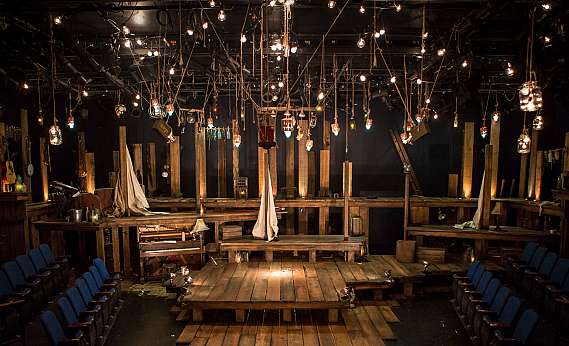Hi, I’m Avital Schoenberg and I’m the assistant director for Writers’ Theatre’s production of The Real Thing. It is an honor to be working on this brilliant and deeply moving play. The Real Thing is often pointed to as intellectual playwright Tom Stoppard’s most personal play, and yet when I read it for the first time my head got very caught up in the neat turns of phrase and brilliant dialogue. It’s been a gift the last couple of weeks to hear these words brought to life by such a talented cast of actors willing to take risks, be vulnerable, and bring to life the soul and the humanity in this brilliantly clever dialogue.
As an assistant director, one of the most fascinating things to learn is not only what notes a director gives to the actors, but when the notes are given. Director Michael Halberstam crafts a journey over the course of the rehearsal process that enhances an actor’s own ability to explore the role. In the first week of rehearsal he’s reminded us that we are playing – “no results,” he says before each scene. This encourages each artist to trust their instincts and be willing to play with their fellow actors, without a correct answer in mind. The emphasis on play trains us to listen and engage with our other actors in the moment rather than manufacturing a performance based on an idea of what these lines mean, independent from an experience of how the other actors are playing them.
Authentic behavior is a particularly interesting challenge for actors. We work in pursuit of truth while engaging in an activity that is inherently unreal. Yet, it is essential that as artists we are able to engage in authentic, truthful behavior under this set of imaginary circumstances. This play, which is in fact about theatre artists navigating their onstage experiences and real-life relationships, spirals in on itself as we are forced to constantly reassess our understanding of “reality.” Even as Stoppard creates a distinction between the world of the play and the world of the actors offstage, we cannot help but be aware of another layer of meta-theatricality – that we are also in a theatre, watching a play.
Stoppard has crafted such a brilliantly structured script that the biggest pitfall is actually getting lost in his structure, bringing attention to the play’s cleverness instead of simply letting that go and challenging ourselves to find the authentic behavior in the moment. This is the magic of seeing The Real Thing, rather than simply reading it. It’s on its feet that we discover the heart amidst the beautifully crafted, clever language Mr. Stoppard has given us. Since day one, Michael has emphasized the importance of playing the authentic need underneath the cleverness rather than constantly playing clever – these people are clever, so they don’t need to play clever. When I first read this play I was stunned by the ways in which Stoppard’s language could capture human experience in a brilliant turn of phrase – yet it has been the actors’ willingness to live that human experience that has made this language not only intellectually resonant but also deeply true.


No comments yet.